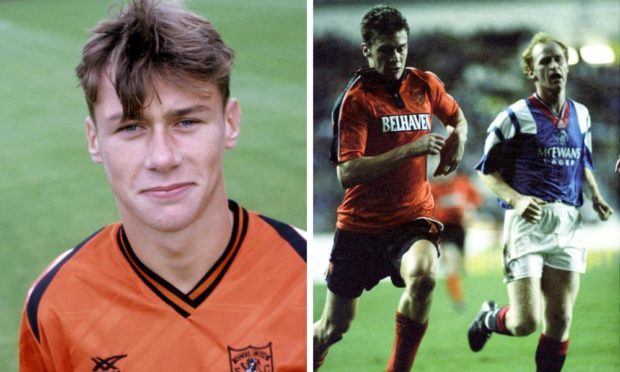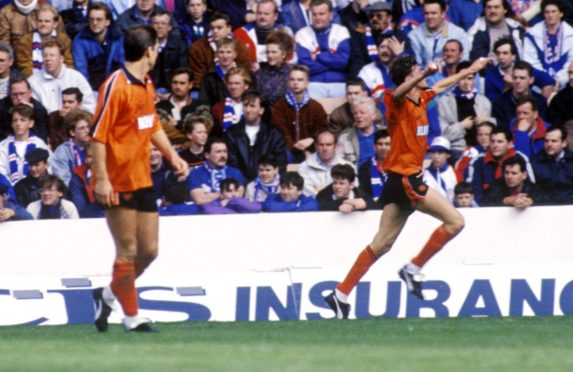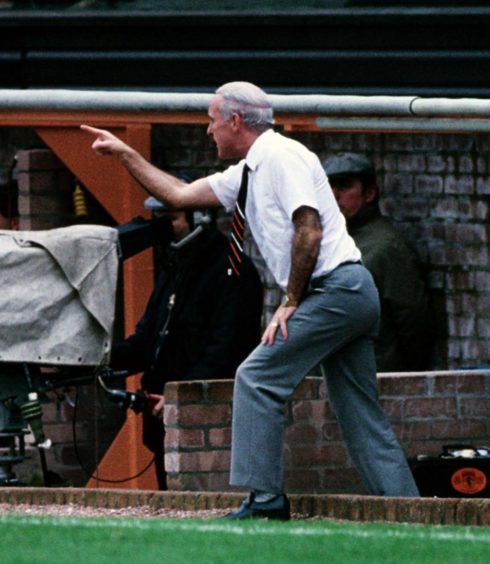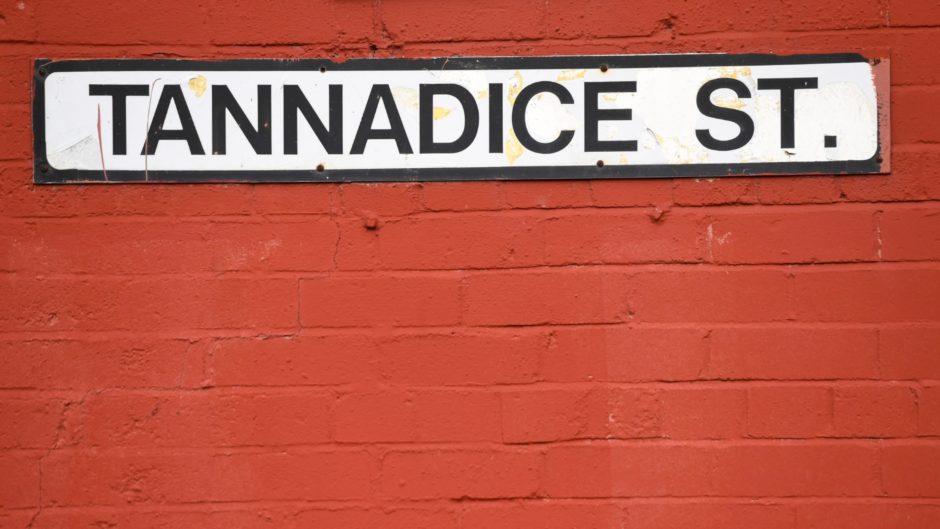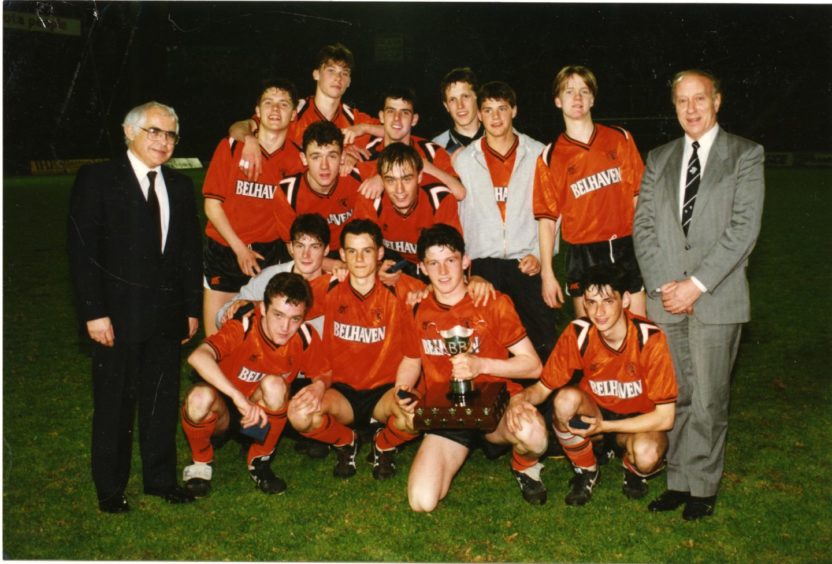Big Dunc. It’s quite something to be known only by your first name and a shortened version at that.
Ask a contestant on Family Fortunes to name a famous Duncan and you can bet Ferguson would score a few points.
Stick his picture up on the board on a well-known teatime TV quiz with the same question posed and he would certainly not be a Pointless answer.
There is the nickname as well, although “Duncan Disorderly” belongs in a troubled past rather than the pleasant present.
Such brand recognition is not unique, of course, even in Scottish football.
For example, we all know who Kenny is even without the word “King” placed before it or “Dalglish” after it.
It is still a special honour, though, and one gained, in Ferguson’s case, thanks to both fame and infamy.
Books have been written and many a debate raged about the imposing Stirling-born striker turned coach.
His career in the game started 30 years ago today in the tangerine and black of Dundee United and continues to flourish as assistant manager at English Premier League side Everton.
He has done not too badly to come from the streets of Raploch to be standing at the right hand of a managerial aristocrat like suave Italian boss Carlo Ancelotti at Goodison Park. However, not everybody’s career path winds through Barlinnie.
The date of his debut was November 10, 1990.
The venue was Ibrox and the occasion was a terrific and thrilling 2-1 victory for United over the Light Blues.
Ferguson, then a promising and much talked about 18-year-old, came off the bench to replace fellow rising star Christian Dailly with 31 minutes left to play.
The first mention of his name in a Rangers notebook was made as the fresh-faced Ferguson headed the ball on to Darren Jackson to assist in the opening goal that afternoon.
It would take the Light Blues two and a half years to act on their initial intrigue but you can imagine it was love – or at least serious interest – at first sight.
He looked extremely comfortable taking his professional bow in front of what should have been an intimidating 37,000-strong home crowd. His working-class Stirling swagger ensured he handled the pressure and then some.
That pencil would have been scribbling away in Walter Smith’s hand – he was then number two to Graeme Souness – on 71 minutes when the tangerine-clad teenager climbed to head on a long clearance to Jackson, who beat Rangers defender Scott Nisbet before clipping the ball over goalkeeper Chris Woods.
Jackson would go on to claim all the headlines that afternoon as it was he who scored the United winner with four minutes left on the clock, cancelling out Ally McCoist’s well-executed equaliser.
Interestingly, the Tangerines’ winning goal was supplied by Ferguson’s fellow sub Alec Cleland, someone else who would eventually end up in Govan.
The Light Blues clearly paid attention to opposition players who hurt them.
The teams lined up:
Rangers: Chris Woods, Gary Stevens, Stuart Munro (Gary McSwegan 75), Scott Nisbet, Nigel Spackman, John Brown, Trevor Steven (Sandy Robertson 7), Terry Hurlock, Ally McCoist, Mark Hateley, Mark Walters.
United: Alan Main, Gijs Steinmann (Alec Cleland 75), Mio Krivokapic, Brian Welsh, Maurice Malpas, Christian Dailly (Duncan Ferguson 59), Billy McKinlay, Dave Bowman, Jim McInally, Darren Jackson, Hamish French.
Footage of the game is hard to come by, other than a clip that only shows the Rangers goal. United fans can make their own minds up about that.
Tangerines’ historian and long-time programme editor Peter Rundo recalls that he wasn’t surprised to see Ferguson make such a bold entrance on to the big stage.
He said: “Watching United at that time you had become rather used to talented young players making an impact in the first team.
“Christian was the obvious one and both he and Duncan were in the side that lifted the BP Youth Cup earlier that year.
“I knew all about him, really, from watching that team, which dominated the youth game at the time.
“Normally when a young player makes his debut and I am in with the Press at a match I get asked questions about them but I think most people seemed to be aware of Duncan already.
“Also, a lot of supporters will have had seen him play for the youth team or the reserves, with Friday night reserve matches at Tannadice back then attracting crowds of up to 1,500 because there was so much quality on show.
“You kind of knew what to expect when he came off the bench that day.
“That didn’t make it any less enjoyable watching him out there.
“And what a debut it was!
“I can clearly recall him playing the ball on to Darren Jackson for the first goal and he was involved in the action right up to the final whistle,” added Peter.
“He posed a physical threat to their defenders despite just being a teenager and you knew that he would be a part of Jim McLean’s plans from that day forward.”
The second scribble in Smith’s blue notebook – he was Rangers boss by then – will have been made when something remarkable involving Duncan happened at the same venue two and a half years later, even though it was the dark blue of Scotland the frontman was wearing at the time.
The Scots hosted reigning world champions Germany in a friendly at Ibrox on the evening of March 24, 1993.
The visitors oozed class and boasted Lothar Matthaus, Olaf Thon, Karl-Heinz Riedle and Jurgen Klinsmann in their line-up.
Riedle scored the winner in a 1-0 victory for the Germans, slipping the ball past home goalkeeper Nicky Walker on 20 minutes, but somehow it was Ferguson who had everyone talking after the final whistle.
The reason was an acrobatic overhead kick that smacked against the German bar and had every member of the Tartan Army up on their feet applauding.
It was a thing of beauty, arguably made even more aesthetically pleasing by cracking the woodwork rather than nestling in the back of the net.
This time Smith decided he had to persuade Ferguson to leave Tannadice and climb up the marble staircase at Ibrox.
The striker’s last match for the Tangerines was at Brockville 10 days later and he left the club on a winning note.
United beat Falkirk 2-1 on April 3, thanks to goals from Paddy Connolly and Grant Johnson.
The visitors lined up:
Main, Malpas, Dave Narey, Freddy van der Hoorn, Michael O’Neill (John O’Neil 85), Johnson, John Clark, McKinlay, Ferguson, Connolly, Scott Crabbe (Cleland 60).
That brought the curtain down on a time at Tannadice that has to be considered a huge success despite some of the off-field drama.
He had fallen out with United manager McLean as the transfer speculation reached a crescendo – Leeds United were also in the mix – but he was just one of many players who didn’t see eye to eye with his gaffer.
The pair clashed often.
For example, Ferguson is alleged to have been involved in an infamous incident recounted by former United player and current Daily Record football writer Gordon Parks.
The story goes that Duncan, Andy McLaren and John O’Neil had been given a punishment exercise by McLean that involved painting the Tannadice gym wall.
The manager erupted in rage when his name and an expletive, both written in emulsion, were left for all to see. You can imagine Ferguson sniggering away somewhere else in the stadium when the discovery was made.
McLaren also alleges that McLean was, to put it mildly, wary of Ferguson’s father, who was also called Duncan.
Chatting to Si Ferry on Open Goal, the ex-United winger claimed: “Big Dunc had him on toast because he was terrified (of) big Dunc’s da.
“I think he’d said something to big Dunc one day and big Dunc…told his da, and his da had come up and he was outside Tannadice and I think big Dunc’s da was going to batter him.”
That is only one side of the story, of course, and McLean was a match for most people who crossed his path.
McLean’s wish was for his player to make the most of his talent.
The Tangerines’ greatest-ever gaffer was later quoted ruing what might have been.
He said: “Duncan Ferguson could have been as good as Andy Gray.
“But his heart has never been in football in my opinion.
“It’s been a job and a way in and a way to money.
“Even from 13 years of age he was absolutely outstanding.
“He was obviously exceptional in the air, his pace and control very good. But his hunger, desire and attitude towards the game were never 100%.”
I’m not sure Duncan’s “da” would have agreed with that assessment of his son.
There were also the infamous pub shenanigans to consider.
For example, the player was dogged by injury all his career and he blamed it on an altercation in The Rock Bar in Dundee when a raw teenager.
In a rare interview for Toffee TV, an independent Everton fans’ channel, Ferguson claimed: “The first injury I ever had was when I broke my big toe.
“I broke it in a fight in a pub called The Rock in Menzieshill in Dundee.
“It never got fixed and to this day I think everything came from that big toe and that fight in The Rock…when I was 18.”
His view of events was challenged, though, by his “opponent” in the rumpus.
Gary Menzies admitted he was the man involved in the bust-up at The Rock but he told the Evening Telegraph: “Big Duncan’s version is wrong.
“He never broke his toe in the fight with me.
“He broke it kicking a toilet door in another pub later that night when he booted it in frustration.
“It all started with an argument over a woman (Mr Menzies’ ex-wife).
“Duncan then started to get up off his bar stool while I was standing – and as I am a lot smaller than him I stuck the nut on him.
“I wasn’t going to wait until he stood to his full height.
“Dunc eventually went to the Ascot Bar with a couple of people in a taxi later that night of the fight and kicked the toilet door in anger at what had happened – and that’s when he broke his toe. It had nothing to do with me.”
Ferguson was living up to his disorderly nickname by now and there were other incidents that led to court appearances, something that would come back to haunt him after his Rangers move.
At the time of his switch to Glasgow, his history was picked up by James Traynor, a future director of communications at Ibrox, who was writing in The Independent at the time.
Traynor penned: “Ferguson has already been fitted with the handle ‘Duncan Disorderly’ and although some use it affectionately it suggests a young man well acquainted with trouble.
“Already he has been fined by the courts for having butted a policeman (£125), and punched and kicked a Hearts fan on crutches (£200), and recently he was placed on a year’s probation for another assault charge.
“Sherriff Charles Smith told him a prison sentence had been considered and that he was not presenting the proper image to youngsters.”
Ferguson collected a Premier League winner’s medal in his first season with Rangers but would have been on the end of a few of his old Tannadice mates’ jokes as he finished on the losing side at Hampden when United won their first Scottish Cup on May 21, 1994, thanks to Craig Brewster’s goal.
The roof would come crashing in on Ferguson when he was found guilty of assaulting Raith Rovers player Jock McStay during a league game at Ibrox on April 16, 1994.
He would do jail time in Barlinnie.
Ferguson claimed later: “It was wrong me being there, it wasn’t fair.
“I shouldn’t have been in there and I think a lot of people understood that.”
Scotsman football writer Alan Pattullo, who authored the critically-acclaimed book In Search of Duncan Ferguson: The Life and Crimes of a Footballing Enigma, relayed McStay’s side of the story in a poignant article.
It was a stark reminder that there are other actors in Duncan’s drama.
McStay opened up about the depression that followed the attack and his subsequent release by Raith.
The ex-Rovers player said: “No one knows I had it.
“No one apart from my wife really knows. I was on medication for 18 years. It changed me, put it that way.
“I am not blaming the headbutt.
“Things happen in life. Getting divorced as well. I stopped playing football at the same time. Everything just happened. Things happen in life you cannot handle.”
Ferguson was given a three-month prison sentence and by the time of the conviction he had already moved south to Everton.
He joined Newcastle United in November 1998 for a bumper fee of £8 million but would play only 30 times for the Magpies before heading back to the Toffees, the club that has a hold on his heart as evinced by his club tattoo.
Of his Goodison love affair, Ferguson said: “The fans here have always been great towards me. They are unbelievable. They took me in and they are the best fans in the country, if not the world.”
His reputation as a tough guy, whether he liked it or not, was enhanced in January 2001 when he successfully fought off two burglars at his home, one of whom ended up in hospital.
He was praised by police for acting “bravely and responsibly.” The rehabilitation of the big man had begun.
Let’s be honest, we all loved seeing him last December when, while in caretaker charge of Everton, he defied the freezing cold and driving rain at Old Trafford by ditching his jacket after deciding a white shirt would be warm enough.
That was the Big Dunc we all know. The swagger, on show 30 years previously on his debut, was back.
